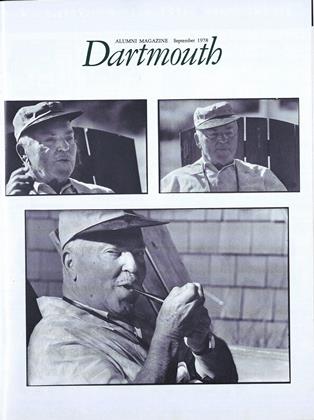REUNION SEMINAR
"Great Issues for Spaceship Earth: Surviving to 2003," featured Professor of Engineering Dennis Meadows and Professor of Government Donald McNemar. Meadows, author with his wife Donella of the popular book Limits to Growth, spoke engagingly, but ominously, as a long-term forecaster for the earth, explaining as he went his original methods.
Having begun to feel some years ago that the stability of the fifties and sixties would not continue, the Meadows pair set to work to analyze the world. "The physical expansion of human growth has reached some limits," explained Meadows. "For 20 or 30 thousand years, the history of humanity was stable, but during the last two centuries, there have been huge explosions of population, resource use, energy use, and food production." In an attempt to understand the basic relationships of human society, the Meadowses contrived computer simulations (known as Systems Dynamics) which would forecast future conditions. They fed the computer past and present figures for population, food and its production, resources, industrial capital, technology, and pollution and then asked the machine to figure out the thousands of interdependencies involved and . make extrapolations as to the future. Their conclusions, in Meadows' words, are these: "Short term solutions won't do. There are no technical answers. The answers are social, institutional, psychological, and ethical."
Meadows had called his brand of forecasting "extrapolativeZ" - that is, based on current conditions and past trends and designed to suggest where the earth will be at some point in the future if it continues as at present. The second speaker, McNemar, lectured the audience on the history of a group of "normative" forecasters - thinkers attempting to posit an ideal future and then work backwards to evolve strategies for getting from here to there. This group, basing its efforts on Grenville Clark's work WorldPeace Through World Law, set up something known as WOMP (World Order Models Project). In 1962, WOMP assembled nine groups of scholars from different parts of the world and asked them to posit their ideal societies and plan transition strategies for them.
The result, apparently, was a Tower of Babel. The groups could not agree on basic values. Some wanted peace; others thought some fighting might be necessary first; some felt national self-reliance was to be given first priority; one felt that first and foremost, materialism must be squelched; one felt that the first step ought to be the arbitrary division of the world into 20 equal states; others thought that the creation of a global governing regime ought to have priority over everything else.
The WOMP organizers' conclusion was that something has to be done about the modern nation-state, which has more power, apparently, than is consistent with global anything. -"The question is," concluded McNemar, "whether we can shift authority upward toward global and downward toward local powers without going through World War III."
There was an unsettling sense at the end of these two lectures that something has got to go. But exactly what, and exactly what it is that's to take its place were tantalizingly beyond reach.
 View Full Issue
View Full Issue
More From This Issue
-
 Feature
FeatureA Company of Stretchers
September 1978 By Cay Wieboldt -
 Feature
FeaturePoet at Full Ahead
September 1978 By Charles G. Bolte -
 Feature
FeatureTHE RIVER and THE DAMS
September 1978 -
 Article
ArticleA Journey: Five days to Big Rapids
September 1978 By Dan Nelson -
 Article
ArticleDickey-Lincoln: Who wants it? Who needs it?
September 1978 By Greg Hines -
 Article
Article'A Spirit of Fire and Air'
September 1978 By NARDI REEDER CAMPION







